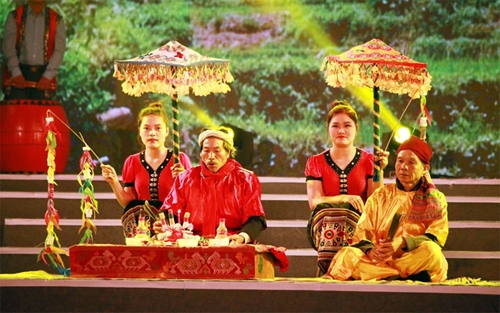These celebrations come after the first thunder of the year due to the ancient belief that thunder marks the arrival of spring.
Hoa Tien village (Chau Tien commune, Quy Chau district) and many other Thai villages in Nghe An still keep the custom called “uong ruou mua hoa.”
“It is only held within the family and organized by shamans. Chickens and ruou can (wine drunk out of a jar through tubes) are must-have offerings to deities,” said Quang Thi Thay, a shaman in Hoa Tien village. After the ceremony, people will drink ruou can to welcome the new year.
    |
 |
|
Xang khan festival in a stage performance |
Another festival called “Xang khan” is organized at the same time in Quy Chau district. “Shamans hold the feast to bless peace and health to their families and the entire village. Importantly, the festival is considered as the shamans’ promotion ceremony,” said Vi Ngoc Chan, a local culture researcher.
The focal point of Xang khan festival is a “xang khan” tree with nine floors of flowers which represent 9 spiritual concepts of the Thai ethnic people. It is colorfully-decorated with shapes of trees, flowers, and birds, which mimic the world and the nature in the Thai belief. People drink ruou can and dance around this huge tree during the celebration.
The dance performances are accompanied by gongs, drums and joyful cheers of participants. These dances simulate a circle of life of an individual, from birth to death. It also describes farming activities and how the next generations are born.
Also celebrated in Que Phong and Tuong Duong districts, Xang khan festival was honored by the Ministry of Culture, Sports and Tourism as the national intangible cultural heritage in 2017.
“In recent years, many localities have taken measures to maintain, preserve and promote its values,” said Ho Manh Ha, Deputy Head of the Heritage Management Division of the Department of Culture and Sports of Nghe An province. Along with others, Ky Son district is conducting a project of “Preservation and development of cultural values associated with tourism development” in an attempt to preserve “Xang khan.”
Translated by Minh Hieu - Le Na- Anh Tuan - Le Xuan